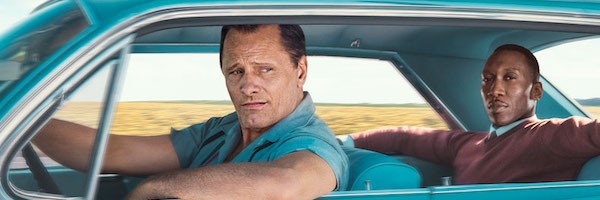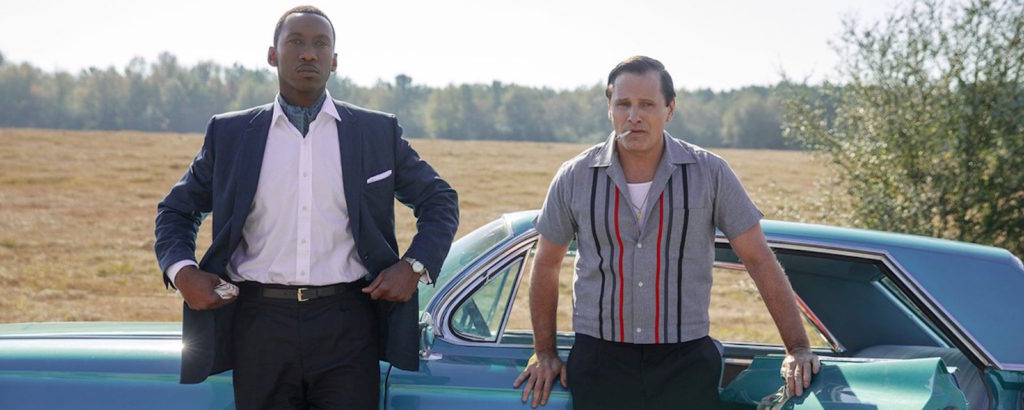Green Book (2018)

DIRECTOR: Peter Farrelly
CAST: Viggo Mortensen, Mahershala Ali
REVIEW:
Like such films as The Help and Hidden Figures touching on similar subject matter, Green Book‘s PG-13 rating and the “feel good” tone it’s aiming for holds it back from ever getting too dark or graphic in its depiction of 1960s racism, but also like the above films, it effectively serves a purpose providing a little history lesson illuminating the systemic racism of the 1960s Jim Crow South, wrapped up in a crowd-pleasing odd couple/buddy movie format. It’s nothing original or groundbreaking, but it’s an engaging and enjoyable film with the most earnest of intentions and bolstered by strong performances from its virtual two-man show of dual Oscar nominees Viggo Mortensen and Mahershala Ali.
The film is based on a true story, albeit with some aspects “Hollywoodized”. In 1962 New York City, Tony Vallelonga (Viggo Mortensen) is a bouncer at the Copacabana renowned for his ability to settle problems with both his fists and his gift for gab. But when the Copacabana shuts down for two months, Tony is forced to find alternative temporary income. Despite being prejudiced against African-Americans, Tony grudgingly accepts a job as chauffeur, personal assistant, and bodyguard for Dr. Donald Shirley (Mahershala Ali), a world-class pianist embarking on a concert tour. Initially, the uncouth, thuggish Tony and the cultivated, refined Dr. Shirley get along like oil and water—Tony takes Shirley for an uptight snob, while Shirley finds the slovenly Tony repulsive—but of course in true odd couple/buddy movie fashion, they eventually begin to form a tentative bond. Shirley helps the inarticulate Tony write love letters home to his wife (Linda Cardellini). Tony comes to Shirley’s rescue on more than one occasion, and witnesses the demeaning ways in which he is treated as their trek takes them southward and they must rely on the Green Book, a pamphlet listing welcoming establishments for blacks in the American South, many of which are far beneath the standards that Shirley is accustomed to.
There’s a little Driving Miss Daisy vibe in Green Book, except the roles are racially reversed, with the white character as the chauffeur. Tony and Shirley also flip racial stereotypes on their heads; the white man Tony is thuggish, street smart, and uneducated, while the black man Shirley is genteel and urbane. Shirley lives in a lavish apartment above Carnegie Hall and is introduced literally sitting on a throne. In addition to being a world-class virtuoso pianist, he speaks fluent Russian and Italian, dresses immaculately, is fastidious about personal cleanliness, and has a taste for refinement and finds rougher conditions difficult to deal with. Tony, by contrast, is a slob whose appetite for food is matched only by his capacity for bullshitting his way out of trouble and isn’t afraid to use his fists when words fail, continually gets Russians and Germans mixed up, puts his foot in his mouth with unrealizing racial stereotypes (he is incredulous when he finds out Shirley has never had fried chicken), and riddles his letters to his wife with scribbles and spelling errors. Considering the movie was written with the help of Tony’s son Nick Vallelonga, it’s not surprising (although it has been an object of criticism) that the movie is predominantly from Tony’s point of view. That’s not to say Shirley is a smaller role, but we “know” Tony better, although that’s partly by design. Tony is simple and straightforward. What you see is what you get. Shirley is more complicated, his uptight closed-off demeanor hiding demons and a conflicted sense of identity as both a non-stereotypical black man and, we eventually learn, a closeted homosexual; blacks perceive him as thinking he’s too good for them, while he finds them hard to relate to (he studied classical music in Russia, and has never heard Little Richard until Tony plays it on the radio), while he performs for wealthy white audiences who praise his music but will never fully accept him. His inner conflict is finally given voice in a rain-soaked outburst (“If I’m not black enough, and I’m not white enough, and I’m not man enough, then who am I?”) that’s one of the only times his cool demeanor cracks.
While it soft peddles some elements of racial discrimination in the Jim Crow South, Green Book does an effective job of showing how ubiquitous racism was, in various both overt and passive-aggressive forms, some more obvious than others. There’s a bit in which Tony comes to Shirley’s rescue in a bar where a gang of thuggish rednecks are roughing him up, but there’s also lower-key instances from even seemingly sympathetic benefactors, such as when a high society patron gives Shirley a warm welcome for a performance at his mansion but then expects him to go outside to the outhouse rather than use the house’s facilities, and Shirley later learns that he is not allowed to dine in the restaurant with the very crowd that he will be performing for. The sight of a white man chauffeuring a black man also sets tongues wagging. Like some other dramas dealing with this kind of subject matter, Green Book is earnest and well-intentioned but not subtle, with some bit characters acting more like stock racist cartoons, glowering and snarling on cue, than real individuals, but the character development and dynamic of Tony and Shirley is well-done—as it should be, considering it’s the central focus, to the point that this could nearly be a two-person play—and the odd couple/buddy movie element is an effective vehicle for its social commentary. Green Book has been categorized as a comedy-drama, but that’s a bit misleading. The tone never gets too edgy or serious, but this is a drama with some lightly humorous moments (mostly related to the “odd couple” bickering of Tony and Shirley).

Viggo Mortensen reaffirms his chameleonic character actor credentials by sinking far enough beneath the skin of Tony Vallelonga that this role isn’t likely to remind anyone of The Lord of the Rings‘ Aragorn, sporting a sizable paunch as a man of large appetites (he devours multiple hot dogs and a whole pizza, as well as any other snacks he lays his greasy hands on) and convincingly adopting the appearance, mannerisms, attitude, and accent of a typical Italian-American “New Yawker” (he sounds convincing, whether in his heavy Bronx accent or when speaking subtitled Italian on various occasions). It’s interesting to note that several of the current Best Actor Oscar contenders involve some sort of transformation, with Rami Malek doing his best Freddie Mercury impression, Christian Bale eerily shapeshifting into Dick Cheney, and Viggo Mortensen turning himself into a chubby Italian Brooklynite. Mahershala Ali’s stoic, aloof role is less flashy but more complex and one could argue in some ways Ali has the harder job of conveying more complicated and conflicted emotions while giving less away outwardly. There’s nothing mysterious about Tony, but understanding Shirley takes an investment of time and attention as the movie slowly peels back his layers to hint at the angst and inner conflict behind a facade of haughty regality. Apart from Mortensen and Ali, no one else gets much screentime or makes an impression; it wouldn’t take much to tweak this into a two-person play.
Green Book, intended to be “feel good” and audience-pleasing, plays it safe and shies away from anything more graphic or disturbing, but its buddy movie/road trip format serves as an effective vehicle for its social commentary and message of two people who are opposites in virtually every conceivable way finding unlikely friendship. Its enjoyable “odd couple” dynamic will give audiences an entry point, but it’s the way it effectively combines that aspect with an underlying strong social conscience that makes it a journey worth taking.
* * *